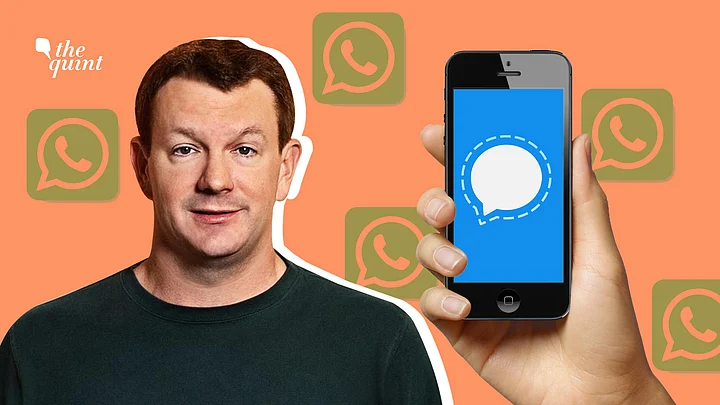Brian Acton, executive chairman of the Signal Foundation, found himself as one of the biggest newsmakers in India last week. WhatsApp’s privacy policy update has resulted in large-scale downloads of open-source Signal messaging app amid concerns over its latest updates and its (now postponed) ultimatum to accept the terms by 8 February or be unable to use the app.
Acton was the co-founder of WhatsApp and left the company in 2017, following Facebook’s acquisition amid differences over issues of privacy, security and monetisation of the app. He went on to co-found the Signal Foundation with Moxie Marlinspike, focusing on developing open-source privacy technology.
The Quint spoke with Brian Acton on the privacy issues at stake, the lessons he learnt as WhatsApp co-founder, how Signal is different in terms of security, and what he means by “when you build for India, you build for the world.”
WhatsApp had given users a now postponed ultimatum to accept the privacy policy update by 8 February. Given its massive user base, WhatsApp knows that it will be difficult for a user to leave the app, which has all our friends, family and co-workers. How do you see this move?
Switching to a new app comes at almost no cost, and the speed with which we have seen people switch to Signal is proof of how simple and easy it is. When WhatsApp was initially growing, most of the world did not have smartphones.
We have a new feature that allows someone to create a group on Signal and then share its link on a WhatsApp group. This allows people to quickly recreate their group experience on Signal.
While WhatsApp has repeatedly assured that personal chats will remain encrypted, it is primarily the expansive and granular metadata collection and sharing that has raised concerns. How do you assess WhatsApp’s data collection practice in India?
It’s not my place to assess WhatsApp’s practices. At Signal, we have a straightforward proposition of how we protect privacy and lay it out in clear terms. Signal is designed in a manner where we don’t collect any data. So, you need not worry about changes in policies or if they would evolve – which might surprise you one day as to how your data is going to be used.
WhatsApp-Facebook’s assurance of not sharing data in 2014 and U-turns on data sharing in 2016 has led to an erosion in trust over the years. What lessons did you take from that episode and how has it shaped Signal’s philosophy on privacy policy?
We have stuck to what we claim since the very beginning and will continue to do so. We don’t want our users to think twice or be suspicious about how Signal handles privacy.
The app was founded to fulfil people’s basic expectations that they won’t be tracked by private companies or the government. It uses state-of-the-art end-to-end encryption to keep conversations secure and private. Signal can’t read users’ messages or listen to calls, or access pictures or videos, and no one else can either.
In an interview with NDTV, you said, “When we build for India, we build for the world.” Could you elaborate on this and share your forecast for India vis-a-vis personal messaging? Do you see privacy growing as a selling point for apps going forward?
India is a country that has always been ahead of the curve at adopting the best technology, and it’s exciting to see it happening again. To see India take such a strong stand, in favor of data privacy and a newer privacy-oriented messenger, speaks volumes.
India is such a large aspect of the internet; I personally think – what India wants is what the internet wants (emphasis Acton’s).
Looking at India and the world resonate with Signal, I think, highlights how people generally dislike the idea of their personal conversations and online activities being leveraged into data that target them. Ultimately, we all want to feel safe in how we communicate.
(At The Quint, we question everything. Play an active role in shaping our journalism by becoming a member today.)
